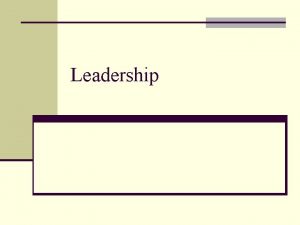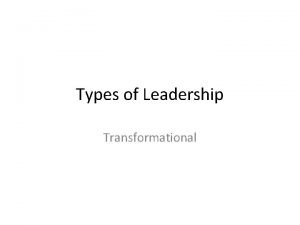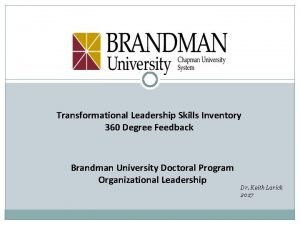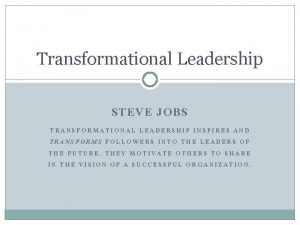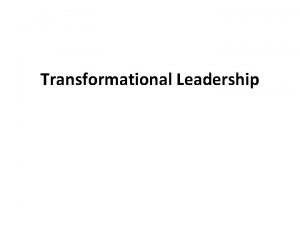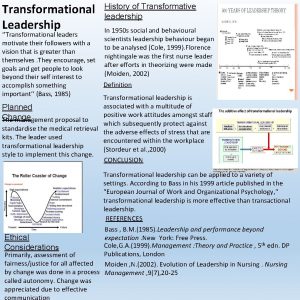Transformational Leadership The perspectives of 17 29 year














- Slides: 14

Transformational Leadership The perspectives of 17 -29 year old student nurses

How do we as nurses in the 17 -29 year old age group see Nursing today ?

§ § § How do we as nurses in the 17 -29 year old age group see the Nursing Profession today? We see Nursing as a profession. It is a science and an art. It comprises of a vast body of knowledge and specialized skills and we view nurses as being highly knowledgeable and skilled individuals who have the power to make a difference in the health and wellbeing of our clients. We see nursing as a progressive career which allows nurses the opportunity of lifelong learning and advancement in their field of interest. We see nursing as a multi pathway career where nurses can branch out into various specialties according to their interest or passion. Nursing textbooks and the public refer to Nursing as a noble profession and a calling. How many times have you heard the older generation nurses quoting that Nursing is a calling and those entering into the profession these days are doing so for reasons other than this calling? Whilst I have not conducted any research to prove or disprove this statement, I would like to leave you with a thought to probe this statement further. Let us consider some of the conditions young students aged between 17 -29 years of age work under. These youngsters volunteer themselves to arrive early for long shifts, during unsociable hours, weekends, public holidays, night duty and the festive period (Do note this is the prime of our lives and our non-nursing peers are out partying). After working long shifts, we get 2 or 3 days off which we must share between rest days, family time, socializing with friends, time for assignments, case studies, research projects, study units, tests and support programmes before we return for our next shift. A large number of students are also forced to use the public transport system during early hours of the morning and late in the evening and may still need to walk home thereafter, putting their safety at risk. Some students take out loans to study nursing and they do not earn a salary in this time. Yet, they do arrive to nurse their patients and still return the next day even if the patient was rude to them. With all of these sacrifices made by young nurses and adolescents, do you think this type of commitment is possible, without being called to nurse? So yes, as youngsters we may not advertise that nursing is a calling but when you see us enter the profession and choose to remain here, know that our choice demonstrates a calling.

Who do we see as our nurse leaders? How do we view our nurse leaders?

§ § Who do we see as our nurse leaders and how do we view our nurse leaders? We see our nurse leaders as those people who are visible in healthcare, those work and efforts inspire us and whose leading we can experience. As young nurses, we are looking for dynamic leaders who can inspire us to do more and be more, We see leaders as those people who sincerely demonstrate a belief in us the younger generation and take the time to notice our potential. We sometimes cannot see our own potential and rely on our leaders to identify this and nurture us towards excellence. Leaders do not need a specific title. We see leaders as any person who has the ability to direct or motivate or nurture someone towards excellence despite the challenges they face in the environment. In LHC we are privileged as students to have a very strong commitment from National and Regional level on student development and empowerment and this is fast making changes at practice level. We also view our nurse leaders in the profession as highly qualified and this inspires us towards the attainment of degrees, honors degrees, masters and phds also. Nurse leaders in the profession are also highly skilled with varying expertise and experience. In LHC , we as young students are duly inspired by the appointment of a CEO for Nursing. We note our ex educators are now doctors of nursing at universities, as well as we are seeing younger nursing Professors these days. This is promising for us the younger generation with regards to future aspirations.

What are our intentions for our future in this profession?

§ § § What are our intentions for our future in this profession? Will we stay or will we go? This is a very topical issue right now amongst young nurses. Many nurses are questioning their future of Nursing in South Africa. Why you may ask? Some reasons we already know of are, the crime rate in South Africa leaves South Africans wanting for a better life in a safer environment, the attractive salaries offered overseas cannot match South African salaries, most nurses see working abroad as an opportunity to travel and it’s also an exciting adventure, the access to further nurse training programmes overseas seems much more viable than in South Africa with a broader area of specialization. However today, I would like us to focus on newer developments in South African Nursing that leaves young nurses feeling insecure about their future career in nursing. The information I am about to give you is from real life discussions, concerning the fears of current nursing students in basic programmes. With South Africa’s higher education system undergoing major changes, this has impacted directly on Nursing Education giving rise to the New Qualifications Framework proposed for 2015. As young students, we see the introduction of a 4 year degree course with Midwifery leading to registration as a Professional Nurse as a positive move. However, for those of us that will qualify under the legacy qualifications as General Professional Nurse or Staff Nurse , it is a time of insecurity as to our future. This fear leaves us exploring options for future career survival or the need for change of career. It is proposed that once the new nursing qualifications is in place, the legacy qualified Professional Nurse General will not be allowed to embark on further training courses without having Midwifery as an ‘essential’ qualification first! In other words if she desires to pursue a specialty such as ICU, Trauma, Theatre she may not unless she has Midwifery first. In fact most universities have already adopted this practice and are refusing access to professional nurses General who want to study community or Pediatric nursing, if they do not have a Midwifery

§ § qualification. Some universities are refusing access to RN general to study nursing education ( if they don’t have Midwifery) even though they may have ICU , Theatre or Trauma and wish to be educators in this particular field. Whilst the National Qualifications Framework of South Africa is founded on 13 principles one of which is access and states the NQF exists TO PROVIDE ACCESS which is EASE OF ENTRY TO APPROPRAITE LEVELS OF EDUCATION AND TRAINING FOR ALL PROSPECTIVE LEARNERS IN A MANNER WHICH FACILIATTES PROGRESSION. As young students we question the access pathways that will be made available to us to study further especially in private healthcare. We are repeatedly told not to fear as nobody will lose their qualifications. However, to date there is no information available on access pathways that will be made available. This is enough to brew sufficient insecurity for nurses to rethink their future in the profession. As young students we understand why our minster of health wants to increase the number of midwives in S. A to combat the incidence of mother and child mortality rate. However, as young students we question if this is the right strategy. Does forcing a midwifery qualification onto nurses guarantee they will work in this field? Are there other factors that contribute to mother and child mortality rates e. g. the lack of resources in rural and state facilities? So for us, it boils down to; what we will do in the future regarding our nursing careers? Bail now and find another career path? Consider starting a degree in another field that would be completed in 4 years and secure employment and further progression? Obtain a loan and pay out our private healthcare funder of training then apply to government facilities to get this “essential “qualification of Midwifery. Or shall we stay in private healthcare as general RNs but be uncertain of future progression? Many of us are faced with these harsh decisions and the light of career survival and yet all we want to do is nurse and be allowed to study further!

? ? ? ? § § § § So I ask you Managers and educators of the private nursing sector: : What current discussions are you involved in to retain RNs General in private? What access pathways are you planning to ensure we can upgrade ourselves in the specialization fields we choose, if we do not have Midwifery? Is there a plan to allow for secondment of newly qualified RNs to go out and do Midwifery and then return to private? Is there a leadership group out there that wants to champion the views of young students and General Nurses, regarding this great concern of losing more qualified RNs? College institutions are you considering a partnership with public health so as to offer Midwifery to Professional Nurses General? And whilst you continue to train staff nurses for service needs, will you be able to retain them if you do not champion for access pathways for their further study? I appeal to you as leaders with powerful influence to be the voice for us, and discuss these issues then give us feedback so that we can feel secure enough to stay in a profession we love.

What do we expect from our nurse leaders?

§ § § § What do we expect from our nurse leaders in terms of supporting students and ensuring a sustainable profession for the future? We expect due consideration for the fact that we are learners i. e. students are work in progress! Leaders should always respond and not react to a student’s mistake or substandard performance. An example of reacting to as student mistake is: I’m really disappointed in you. For your level you should know this. Didn’t they teach you this in college? An example of responding is: have you ever done this before? Tell me what you know about this procedure? Feedback to a student must always build and not break a student. We expect leaders to be familiar with the concept of NUTURING STUDENTS AND NEWLY QUALIFED STAFF. What you put in is what you will get out! Have you ever wondered why students will have a problem in the clinical setting but will never say anything and rather opt to speak to their clinical facilitator or educator about this? This is because teachers are generally nurturers. They make time to listen to students. They practice fairness. They discipline us firmly, but never hold it against us when they see us the next time. When we make a mistake, they do not view it as a catastrophe but rather an opportunity to bridge a gap before we qualify. We also expect exposure during training and expect leaders to create vast learning opportunities for students in practice as well as the classroom. This will ensure confident and competent graduates and a nursing workforce. As students we expect leaders to be knowledgeable of the different generations they lead and use strategies that apply to the specific generation. Managers should take an interest in what our curriculum entails and the high level at which it is set. This will give them an idea of why some students battle with the course and also give them the realization of how much has changed since they trained.

§ Managers should manage costs effectively but never allow this to jeopardize a student’s learning experience in the unit. We are looking forward to the nursing strategy 2014 which talks of students not being part of the workforce for a period of hours. This will allow for more mentoring and better learning experiences. § With the constant talk of integrating theory to practice, educators should be visible in practice in the form of random clinical visits to students and should not be confined to assessments. This also leads to classroom teaching being more relevant. Educationists should review the curriculum for students especially with regard to the communication module i. e. just as managers have to be learn how to deal with the different generation of nurses, students too should be taught how to respond to staff and managers of different generational groups, especially since we will be leading teams once qualified and are most likely to become unit managers in the near future. Educators should be aware that the millennial generation nurses thrive on structure and technology and thus although one can say it is adult education, structured guidance is always very important. We desire for influential leaders to advocate for nursing assistants, staff nurses and registered nurses with general, to have access to pathways for additional qualifications at colleges and universities, to stop placing so much emphasis on the number of qualifications needed for nursing and focus instead on providing programmes that allow specialization in an area and meets the needs of our clients. We expect leaders to motivate us and lead by example in the profession. We are looking for role models. § §

§ § § I was asked to speak on the expectations of young nurses on transformational leadership and I believe I have. In a nutshell transformational leadership refers to leading change. This room is filled with leaders that have influence and power to make dynamic changes. I appeal to each of you to sustain this profession by nurturing young nurses. Motivate them, support them, believe in their potential to become great leaders and most importantly create access pathways for nurses to further their careers. I am Joselyn Appadu who left a Bcom degree to pursue a calling in Nursing. I have made sacrifices that hurt my pocket to further my career. I am a dedicated and compassionate nurse with leadership abilities. I am hoping my profession will allow me and many others with my similar story to remain in Nursing and pursue our dreams! I must thank you all for your time and interest in the perspectives of young students. I also applaud all those leaders that inspire us and believe we have the potential to lead nursing in the future. I would like to take this opportunity of thanking my Nurse Manager Mrs Anne Williamson for her continued support to students and my Nursing Standards Manager Mrs Glaeser. I must also thank my CTS Sr Gotham; you are passionate, competent, professional and a role model to us. Thank you.

THANK YOU
 Transactional leadership vs transformational leadership
Transactional leadership vs transformational leadership Leadership perspectives
Leadership perspectives Transformational leadership factors the 4 i's
Transformational leadership factors the 4 i's Steve jobs as transformational leader
Steve jobs as transformational leader Transformational synonym
Transformational synonym Gandhi transformational leadership
Gandhi transformational leadership Examples of idealized influence
Examples of idealized influence Transformational leadership degree
Transformational leadership degree Individualized consideration
Individualized consideration Howard schultz leadership qualities
Howard schultz leadership qualities Transformational leadership
Transformational leadership Lydia dreyer
Lydia dreyer Transformational leadership steve jobs
Transformational leadership steve jobs Steve jobs leadership style transformational
Steve jobs leadership style transformational Four i's of transformational leadership
Four i's of transformational leadership


